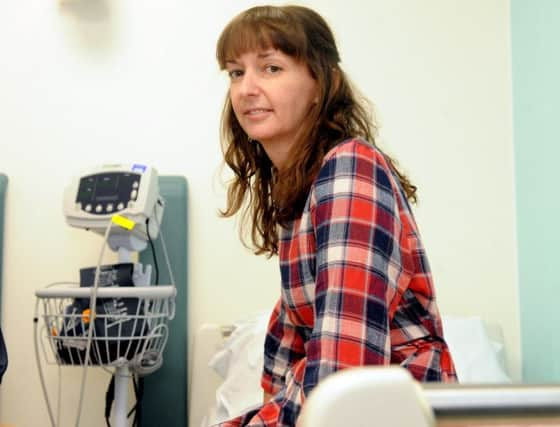Ebola nurse Pauline Cafferkey fighting for life


Pauline Cafferkey, 39, was flown by military helicopter to an isolation unit at the Royal Free London Hospital on Friday after she was admitted to hospital in Glasgow on Tuesday.
Experts said it is likely the virus levels have increased in her body, causing her condition to become critical in an “unprecedented” medical situation.
Advertisement
Hide AdAdvertisement
Hide AdThe hospital said in a statement: “We are sad to announce that Pauline Cafferkey’s condition has deteriorated and she is now critically ill.
“Pauline is being treated for Ebola in the high-level isolation unit at the Royal Free Hospital.”
Ms Cafferkey, from Cambuslang, South Lanarkshire, was diagnosed with Ebola in December after returning from working as a volunteer in Sierra Leone and spent nearly a month at the Royal Free Hospital before being discharged in January.
It is unusual for the virus to strike again after so long but the lack of survivors has meant there is very little data, said virologist Professor David Evans.
Prof Evans, of St Andrews University, said: “Now we have 13,000 people who have survived this most recent outbreak so we may well see more complications presenting.
“So it is rare but it’s rare because we haven’t seen outbreaks on the scale.”
Viruses like Ebola can cause damage to tissue and organs, which cause pain years after recovery, as well as lingering in the parts of the body that are hard to reach by the immune system for months, he said.
Prof Evans added: “I think it is interesting that the Royal Free is describing her condition now as Ebola whereas previously it was treating her for symptoms only.
Advertisement
Hide AdAdvertisement
Hide Ad“It is possible that the virus levels have increased, which is extremely serious. On the other hand she was previously treated and made a good recovery so there is hope that it is being treated early enough.”
Dr Nathalie MacDermott, clinical research fellow at Imperial College London, said: “She will be receiving the best available care at the Royal Free Hospital but this is an unprecedented situation in medical terms and an uncertain time for Pauline and her family.
“It is unlikely that anything could have been done to prevent this relapse; this is an unexpected situation which could not have been anticipated.” Virologist Prof Jonathan Ball said it was “staggering” to see a case of such severity so long after the patient has recovered.
Prof Ball, professor of molecular virology at Nottingham University, added: “I am not aware from the scientific literature of a case where Ebola has been associated with what we can only assume as life-threatening complications after someone has initially recovered, and certainly not so many months after.”
Health officials are monitoring 58 people who had contact with Ms Cafferkey.